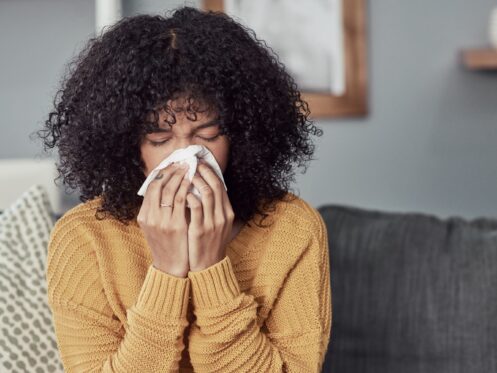If you suffer from allergies, you know how challenging Denver’s summer can be. Pollen from grass, trees, and weeds fills the air, while vehicle emissions and other urban pollutants make breathing harder. And while your home should offer relief, allergens often find their way indoors.
Air purification helps clear the air by removing pollen, dust, and other particles, making your home a more comfortable place to retreat to. Check out this guide to improve your indoor air and reduce your symptoms this summer.
Common Allergens in Denver
Denver’s unique environment contributes to a wide range of seasonal allergens. In late spring and early summer, trees such as elm, oak, and cottonwood release significant amounts of pollen. Weeds like sagebrush and ragweed also add to the problem. On dry, windy days, this pollen travels easily and often enters your home through open windows or on your clothes and personal items.
Once indoors, these outdoor allergens combine with common indoor irritants, which can make allergy symptoms worse. Many homes have poor indoor air quality due to high levels of volatile organic compounds, or VOCs. These are often released by new building materials, air fresheners, and chemical-based cleaning products.
Everyday activities like cooking and doing laundry can also contribute by releasing airborne particles that affect air quality over time. Add in dust, mold spores, pet dander, and fur, and your indoor environment can quickly become a significant source of discomfort during allergy season.
The Use of Air Purification
There are several types of air purifiers available, including portable units that can be moved from room to room. While convenient, these models typically cover only a limited area and may not significantly improve air quality throughout your entire home.
A whole-home air purification system integrated with your HVAC equipment is often the better choice for more comprehensive results. As your air conditioner runs during the summer and peak allergy season, the system continuously filters out airborne pollutants and allergens.
Whole-home air purifiers provide a higher level of filtration than standard HVAC filters. High-efficiency particulate air (HEPA) filters, for instance, can capture up to 99.97% of airborne particles as small as 0.3 microns, including pollen, mold spores, dust, and bacteria. Many systems also include activated carbon filters, which help remove volatile organic compounds (VOCs), pet odors, and cigarette smoke from your indoor air.
Some purification systems incorporate ultraviolet (UV) light technology for added protection. These UV components target and neutralize biological contaminants such as bacteria, viruses, and mold spores as air passes through your HVAC system. When used in combination with mechanical filtration, UV light can enhance overall indoor air quality and help reduce exposure to airborne pathogens. By removing a wide range of allergens and irritants, air purification systems make it easier to breathe during Denver’s allergy-heavy summer months.
How to Choose an Air Purifier
To combat Denver’s allergy season, you should consider several factors when selecting an air purifier. For example, the amount of square footage that you need to filter is essential. Choosing a unit that is too small will result in fewer allergens being removed, and your equipment may run constantly to try to keep up. Ideally, an air purifier should be able to change the air in your home four or five times per hour. This ensures that pollen, dust, and other irritants are removed consistently throughout the day.
Additionally, think about the kind of filter the unit uses. Make sure it can capture very small particles, ideally as small as 0.3 microns. Also, check how often the filter must be replaced. Some units come with a light that indicates when it’s time for a change. On the other hand, electrostatic models don’t require replacement filters; instead, they use collection plates that must be cleaned regularly.
Some air purification devices are also equipped with smart technology, allowing you to monitor your indoor air quality or control the system using your smartphone or tablet. This added data and convenience can make it easier to maintain healthy air quality throughout allergy season.
Routine Maintenance Needs
Make sure that you schedule routine inspections and maintenance for your air purifier. Some homeowners choose to make this part of their annual HVAC appointment, which can be scheduled prior to the start of summer. Our team can ensure your equipment is working properly and doesn’t require any repairs. We can also clean important components on your air purifier and service any worn-out parts.
Consider Relative Humidity Levels
If the humidity in your home rises above 50%, it can increase the amount of particulate matter suspended in the air. Moist air holds onto more particles, which can worsen allergy symptoms. High humidity can also make the air feel warmer and more uncomfortable, compounding the impact of allergens. A whole-home dehumidifier helps control excess moisture and improves overall air quality.
While Denver’s summer brings a surge of pollen-related allergies, many people also experience symptoms in the fall, winter, or spring due to dust, mold spores, or pet dander. During these cooler months, indoor air can become overly dry. A whole-home humidifier can restore moisture, making the air easier to breathe and helping to soothe irritated sinuses and airways. Managing humidity year-round is an important step in controlling allergy symptoms, no matter the season.
Other Important Considerations for Allergy Sufferers
You can take several additional steps at home to support healthy indoor air quality and reduce allergen buildup. One of the most effective strategies is ensuring your home is properly ventilated. Ventilation helps remove stale air and introduces fresh air into your living space. Ensuring you have clean dryer vents and air ducts also helps, since the built-up dust can be pushed back through your home.
To avoid bringing in more allergens, be sure any incoming air is filtered through an appropriate system. In many cases, a mechanical ventilation system, such as an energy recovery ventilator (ERV), can help exchange indoor and outdoor air while capturing allergens and maintaining indoor comfort.
Personal habits can also make a difference. Showering and changing clothes after spending time outdoors can help prevent pollen from accumulating inside. Additionally, washing bedding frequently and using allergen-proof mattresses and pillow covers can reduce exposure to dust mites. Vacuuming your mattress when you change your sheets is another helpful measure.
If you have pets, grooming them regularly helps reduce the amount of pollen, dander, and fur that builds up in your home. Keeping pets out of bedrooms and off upholstered furniture can also minimize allergen spread. If you are considering a new pet, look for breeds that shed less or are known to be more allergy-friendly.
Finally, minimizing clutter can make it easier to control dust and allergens. Choosing hard flooring over carpet, blinds over heavy curtains, and smooth furniture surfaces instead of plush materials can significantly cut down on the number of surfaces where allergens collect. Together, these changes can make your home a more comfortable environment during allergy season and throughout the year.
Contact Your Local Air Quality Experts
Horizon Services is here to help you improve the air quality in your Denver home and find relief from seasonal allergies. Our experienced team can perform routine maintenance on your HVAC and air purification systems to keep them working at peak performance. We also install new purification equipment to enhance filtration and indoor comfort.
Contact us today to schedule an appointment with one of our experienced technicians.


